4db原则(法则)-英文原文 -福禄克DSX2-8000/DTX-1800
A YouTube video explaining how this this works is also?available from here.
This is applicable to the following cabling standards only:
- ISO/IEC 11801
- EN 50173
- Aus/NZ
- JIS
When?the Insertion Loss is less than 4.0 dB at the frequency point where the measurement is made, then the measurement is ignored and not evaluated against the selected Test Limit/Cabling Standard in the DTX CableAnalyzer. This is often referred to as the 4 dB rule. It is not applied in the North American TIA Cabling Standards. Only certain test parameters and configurations will have the 4 dB rule. The tables below indicate which link? definitions and test parameters have the 4 dB rule applied to them. As an aid, the other rules are also listed.
On a?short link, the Insertion Loss may never reach 4.0 dB. If that were to happen, then the entire measurement would be?ignored, or as the cabling standards phrase it; “recorded for information only”. If this were to happen with your DTX CableAnalyzer, you would see an “i” appear next to the summary result for that test parameter. In LinkWare software, the result would be recorded with “N/A’. An example is shown below:
Concern is normally caused when the result has a negative margin. In this example we see the NEXT margin was -9.7 dB. A?negative margin is normally associated with a FAIL, but because the entire link never exceeded 4.0 dB Insertion Loss, it’s not a FAIL. Further?confusion lies in that the North American ANSI/TIA/-568-C.0 cabling standard does not have this 4 dB rule. If you were to test the same link above?with the same DTX CableAnalyzer, but using the North American Standard TIA Cat 5e Perm. Link, your result would be a FAIL.
Please make sure you?have agreed in a Test Limit, in writing, before the project starts.
Let’s review in detail how this works by looking at another example test result on the DTX CableAnalyzer.
An ISO11801 PL Max Class D AUTOTEST was run on a short 6.0 m installed link, giving the following result:
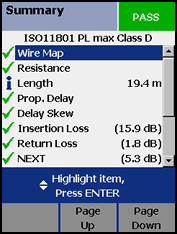
Looks normal. Let’s take a look at the NEXT result in a little more detail:
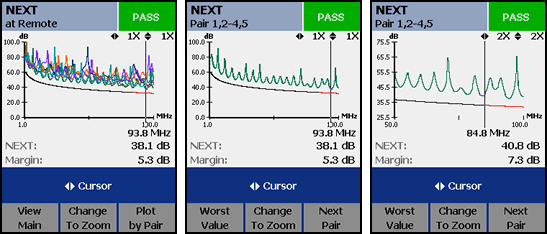
You will observe that?the limit line has two colors, black and red. The cabling standards do not require the cable tester manufacturer to display where the 4 dB rule is implemented to the user, only that it is implemented. However, the DTX CableAnalyzer will indicate where the 4 dB rule has been implemented by changing the color of the limit line. If the?limit line is black,?the Insertion Loss was less than 4.0 dB. If?the limit line is red,?the Insertion Loss was 4.0 dB or greater. So for this Pair 1,2-4,5 the NEXT is not evaluated below 84.8 MHz. Let’s take a quick look at the Insertion Loss for Pair 4,5:
As you can see, the Insertion Loss reached 4.0 dB at 84.8 MHz, as previously indicated in the NEXT Pair 1,2-4,5 graph above. NEXT contains two pairs. So which Insertion Loss pair do we use to implement the 4 dB rule? The disturbed pair is used for evaluation purposes. So if the worst case NEXT Pair was 1,2-7,8 then the?DTX CableAnalyzer would use the Insertion Loss values from Pair 7,8 to determine where the 4 dB rule is implemented.
As previously mentioned, if the link is particularly short, then the Insertion Loss may never reach 4.0 dB and the entire NEXT result is “ignored”. Let’s take a closer look at the first example where the test result was:
Looking at the worst case NEXT result, we see the entire limit line is black, suggesting that the Insertion Loss for Pair 4,5 never reached 4.0 dB:
Looking at the Insertion Loss for Pair 4,5:
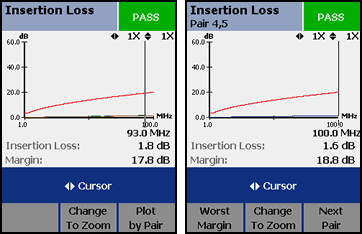
We see that the Insertion did indeed never reach 4.0 dB, so the entire measurement is not evaluated against the limit line (ignored) and recorded as “i” Information Only. If this result was downloaded to LinkWare Software, the report would show N/A against this measurement:
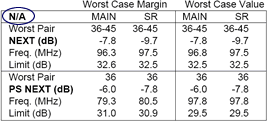
No further action is required by the installer. This is a valid standards compliant result.
本文关键字: 4db, Fluke, 福禄克
原创标题:4db原则(法则)-英文原文 -福禄克DSX2-8000/DTX-1800
原文链接:http://www.faxytech.com/archives/4db-rule-2.html
版权说明:本文为深圳市连讯达电子技术开发有限公司官网(www.faxytech.com)版权所有。如果您需要转载,请注明出处并保留原文链接!如为转载文章会注明文章出处,转载文章不代表本公司观点。对于某些同行无耻恶意抄袭剽窃连讯客户案例的违法行为,连讯将追究法律责任!
详情请致电连讯公司:0755-83999818

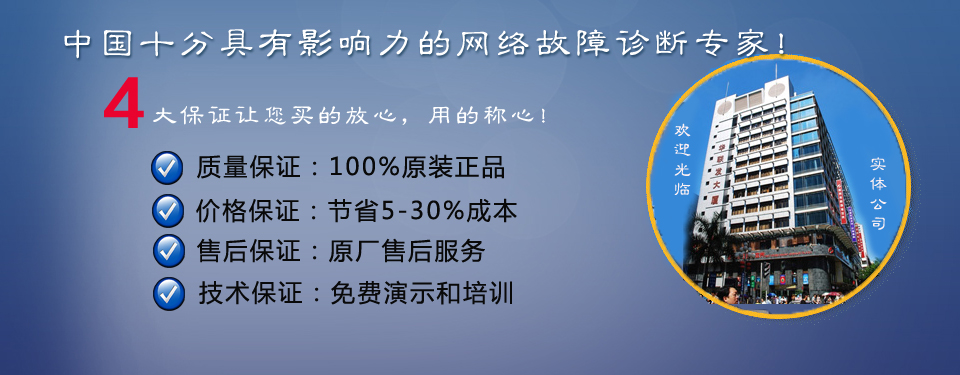

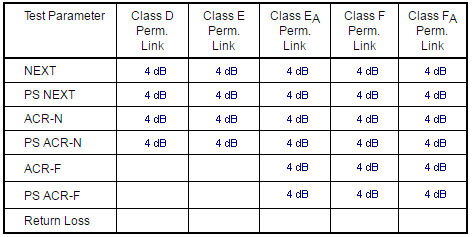
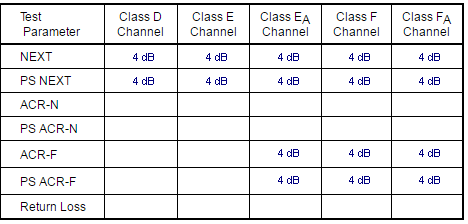
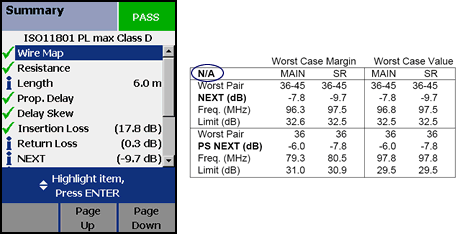
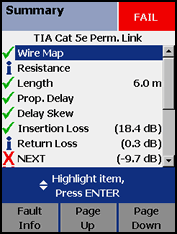
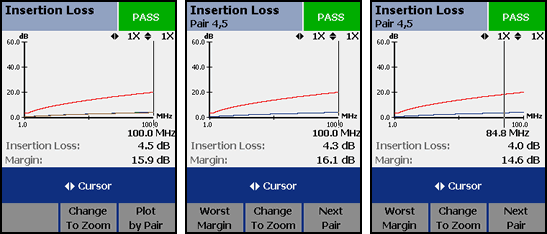
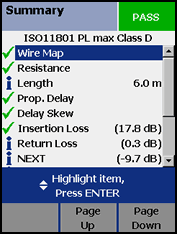
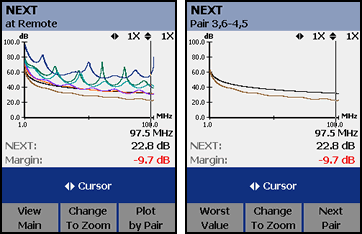

 新一代中文手持式测试仪 – 省时省力。
新一代中文手持式测试仪 – 省时省力。
 新一代中文手持式测试仪 – 省时省力。
新一代中文手持式测试仪 – 省时省力。
 新一代手持式网络分析仪 – 省时省力。
新一代手持式网络分析仪 – 省时省力。
 新一代快速OTDR测试仪 – 省时省力。
新一代快速OTDR测试仪 – 省时省力。


